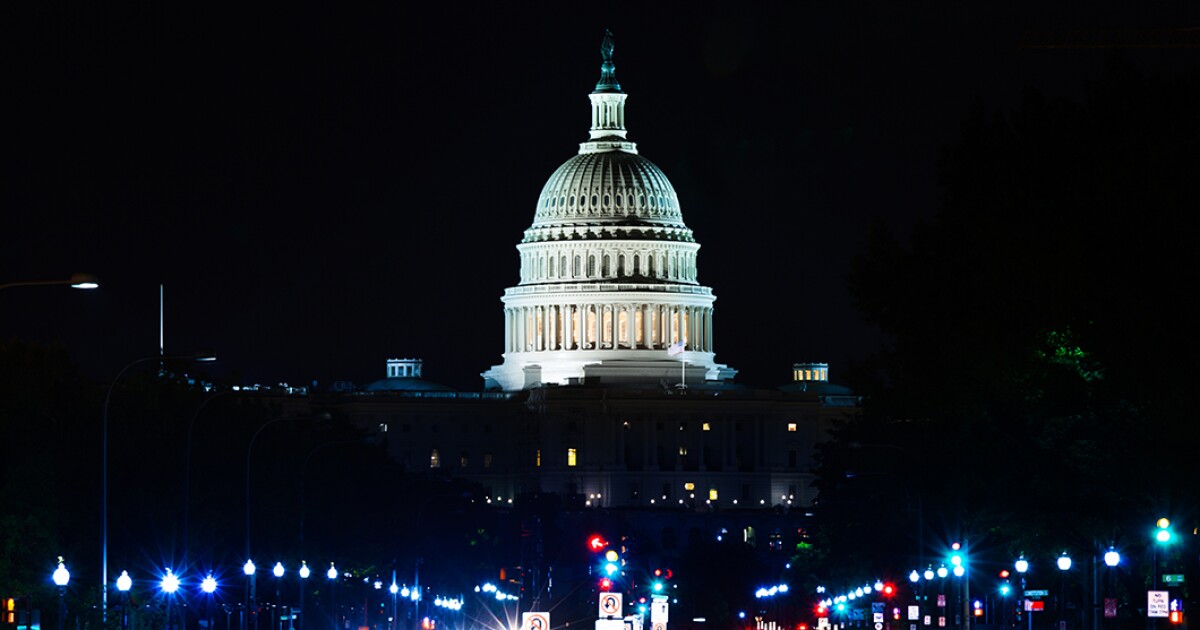

The Senate passed a clean continuing resolution that originated in the House on Saturday, just hours before the federal government was set to run out of funding and shut down.
The Senate voted 88-9 for the continuing resolution on Saturday night, which is a temporary spending bill that allows the federal government to continue functioning for 45 days, buying lawmakers more time to negotiate a deal for the annual appropriations bills. It now will head to President Joe Biden‘s desk. Senators who voted against the measure were Mike Braun (R-IN), Rand Paul (R-KY), Ted Cruz (R-TX), Eric Schmitt (R-MO), JD Vance (R-OH), Roger Marshall (R-KS), Bill Hagerty (R-TN), Mike Lee (R-UT), and Marsha Blackburn (R-TN).
Senate Republicans abandoned a previous bipartisan continuing resolution after House Speaker Kevin McCarthy (R-CA) abruptly changed the plan Saturday morning, announcing the House would be taking up a 45-day continuing resolution that would include disaster relief funds but no funding to aid Ukraine.
After the House passed the bill that kept government funding at fiscal year 2023 levels, provided $16 million for disaster relief, an extension of a federal flood insurance program, and an extension for the Federal Aviation Administration, Senate leaders ultimately decided to vote on the House’s version in an effort to prevent a government shutdown.
HOUSE PASSES 45-DAY CONTINUING RESOLUTION, SENDING BILL TO SENATE HOURS BEFORE SHUTDOWN
“I think at this point, anything that keeps the government going, I would support,” said Sen. Thom Tillis (R-NC) earlier Saturday, reflecting on the plan which does not include aid for Ukraine.
Senate leaders had previously advanced legislation to fund the government until November that included $6 billion for Ukraine, with the anticipation that they could approve the rest of the aid at a later point.
“I’m confident the Senate will pass further urgent assistance for Ukraine later this year,” said Senate Minority Leader Mitch McConnell (R-KY) ahead of the vote.
McConnell made an impassioned defense for voting to advance the Senate’s original bipartisan continuing resolution that included aid for Ukraine to the conference, but was unsuccessful and ultimately recommended members of his caucus vote against the previous proposal in the Senate.
“It looks like there may be a bipartisan agreement coming from the House. So I’m fairly confident that most of our members are going to vote against cloture,” McConnell said earlier on Saturday. “Not necessarily because they’re opposed to the underlying bill — to see what the House can do on a bipartisan basis, and then bring it over,” he added.
Senior administration officials told McConnell last weekend that the U.S. could not sustain Ukraine aid for the next 45 days without additional funding in the continuing resolution, according to aides familiar.
Those who support adding Ukraine aid are concerned that not including it in the continuing resolution will send a message to Russian President Vladimir Putin.
“I don’t understand how so many people said they’d be there for Ukraine now suddenly are saying let’s do the current House version,” Sen. Mark Warner (D-VA) told POLITICO. “It not only cuts off Ukraine, but cuts off transfer authority.”
Senate Democrats say they plan to begin moving a supplemental funding package for Ukraine as soon as next week.
“Leader McConnell and I have agreed to continue fighting for more economic and security aid for Ukraine,” said Senate Majority Leader Chuck Schumer (D-NY).
Sen. Richard Blumenthal (D-CT) said it’s still unclear how additional funding will be secured, following a meeting of Senate Democrats on Saturday.
“We’ll do everything we can to make sure that aid to Ukraine is uninterrupted,” he said.
Once President Biden signs the legislation into law, both chambers have more breathing room to negotiate and pass their 12 appropriations bills.
Ahead of the August recess, the Senate Appropriations Committee approved all 12 bills in line with the caps laid out in the debt ceiling deal negotiated by President Joe Biden and House Speaker Kevin McCarthy (R-CA). The agreement limits overall national security spending in fiscal 2024 to $886 billion, which is roughly a 3% increase from current levels. In fiscal 2025, defense spending would be capped at $895 billion, a 1% increase from the previous year.
CLICK HERE TO READ MORE FROM THE WASHINGTON EXAMINER
Last week, the Senate failed to pass a procedural vote on a larger spending bill that would have funded the Departments of Agriculture, Transportation, and Housing and Urban Development, as well as Veterans Affairs and military construction, after top Republicans voted against the measure in an effort to buy more time to strike a deal.
The vote came down largely along party lines, with Republicans voting against limiting debate on an attempt to change Senate rules to keep the minibus together, in an effort to get everyone on board with the process before moving forward with amendments.
Reese Gorman contributed to this report.





